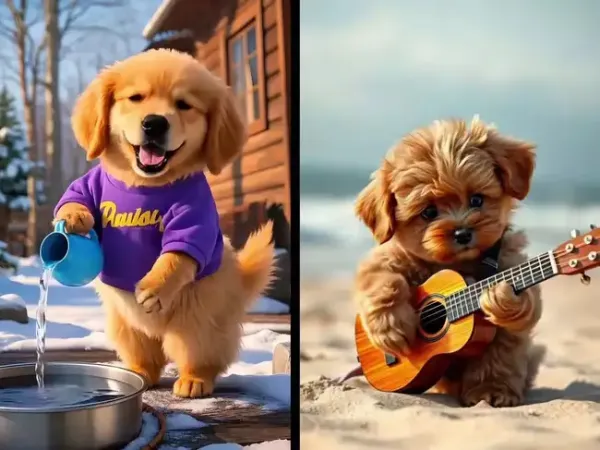Related
- Rs 1.5 crore for a doll? The viral rise of Labubu and the madness behind it
- 'I am going to space': NASA debunks viral influencer’s astronaut claim. Here is what really happened
In a digital age where viral content reigns supreme, a surprising contender has clawed its way to the top: AI‑generated pet dramas. According to a recent South China Morning Post report, these short, melodramatic animal tales are racking up views in the hundreds of millions and turning their creators into unexpected micro‑influencers.
As pet lovers and social media strategists alike watch this phenomenon unfold, one question looms: are we witnessing a fleeting novelty or the dawn of a new storytelling era—one where our furry friends, real or fabricated, become the stars of tomorrow’s digital melodramas?
From Scrappy Stray to Rags‑to‑Riches Cat
One standout example features an underdog—literally—ginger cat who endures mockery by a white cat and her wealthy dog beau, only to reinvent himself as a construction worker turned millionaire. This 59‑second saga amassed nearly 150 million views by early June. Its creator, known only as Ansheng, told SCMP that the clip “brought in more than a million followers in less than two months.” Using free AI tools and simple script tweaks, he produces two to three episodes daily at minimal cost.How AI Pays the Bills
Far from a mere hobby, these pet dramas have become lucrative ventures. Ansheng revealed that a single video surpassing 10 million views can earn between 1,200 and 2,000 yuan (US$170–280), translating to roughly 20,000 yuan (US$3,000) per month. “I made only 50 yuan for an 8 million‑view video on a local platform,” he admitted, explaining his shift to overseas hosts with friendlier payouts.Dog Dramas Enter the Kennel
The feline soap isn’t alone. On China’s mainland, AI‑generated dog mini‑dramas are captivating viewers with their fairy‑tale twists. One series casts a humble Bichon Frise as a disguised princess who endures palace bullying before finding her “Prince Charming.” These episodes not only delight fans but also double as product endorsements—pet shampoos, pasta sauce, you name it—blurring the line between storytelling and advertising.The Secret Sauce
What makes these digital dramas so addictive? “People do not sympathize with cats or dogs, but the emotions they carry,” Ansheng told South China Morning Post, pinpointing the heart‑tugging twists that keep audiences hooked. By personifying pets with human struggles and triumphs, creators exploit our empathy, proving that even in the era of AI, a good dose of feeling remains the key to internet fame.As pet lovers and social media strategists alike watch this phenomenon unfold, one question looms: are we witnessing a fleeting novelty or the dawn of a new storytelling era—one where our furry friends, real or fabricated, become the stars of tomorrow’s digital melodramas?





